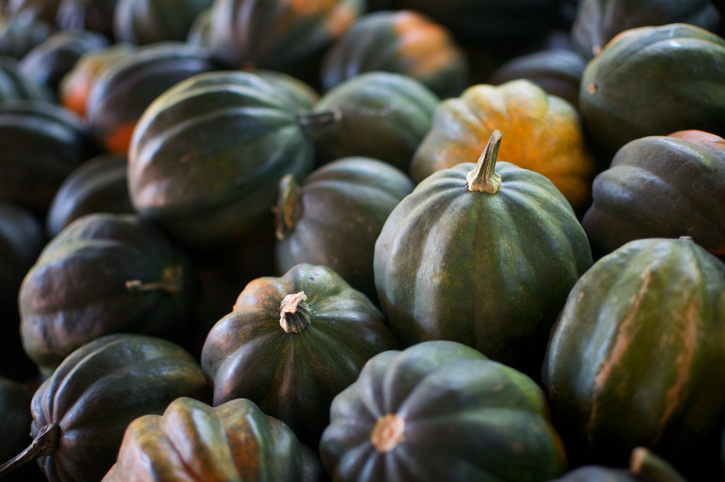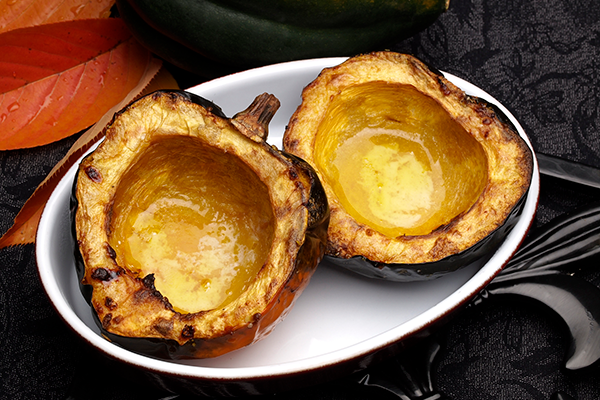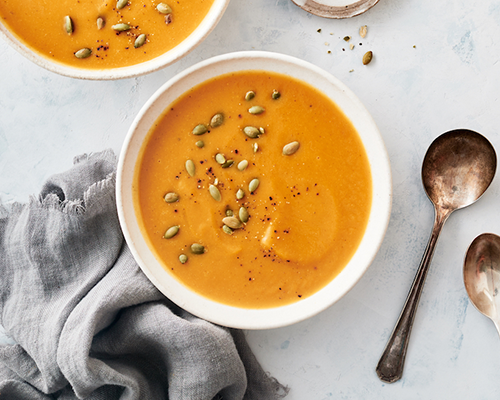How to Cook Acorn Squash

Acorn squash is a kind of winter squash with a dark green rind and golden-orange flesh. It’s shaped like an acorn and might be just as tough! Earlier civilizations were known to roast whole acorn squash in outdoor clay and brick ovens.
But don’t be put off by the tough exterior — we’ll share tips on how to cook acorn squash with ease and use it in various dishes.
How to Choose and Prep Acorn Squash
How can you tell an acorn squash is ready to cook? When buying acorn squash, choose ones that have no soft spots or bruising. A ripe squash is a deep green with a yellow spot.
Wash and dry your acorn squash since the outer skin will be edible. In fact, most recipes will tell you to keep the skin intact, so you don’t need to peel the squash (unless you really don’t like the skin).
If you want to eat it sans skin, peel it after you cook the squash — it’ll be much easier!
How to Cut Acorn Squash
Be careful not to injure yourself — cutting into an acorn squash is tricky because of its odd shape. Always use a sharp and sturdy knife.
- Check for a flat, stable bottom. If your squash doesn’t sit flat, cut the squash’s bottom (where you see the bottom stem) to create a flat surface. Then, stand it upright.
- Cut the squash slowly. Place the knife at the top of the squash and rock the blade side to side, using your free palm to apply pressure to the top of the knife. It’s OK to lift the knife out and reposition as needed since you don’t want the blade to get stuck.
- Slice all the way through. If you’re almost done and the knife won’t budge, use your hands to pull the squash apart; just be mindful of your blade.
How to Roast Acorn Squash
Perfectly roasted acorn squash is mild, sweet, nutty, and very easy to make. Once you’ve cut your acorn squash in half, use a spoon to remove the seeds. Then follow these steps:
- Preheat the oven to 400° F.
- Season your squash halves. For savory squash, lightly coat with nonstick cooking spray, then sprinkle with salt and pepper. For a sweet, caramelized squash, lightly coat with nonstick cooking spray, then sprinkle with sugar or honey and a dash of your favorite spice (e.g. cinnamon).
- Put the squash in a baking pan. Place it flesh side down if you prefer a little char. If you’re concerned about the squash drying out, keep it flesh side up and pour in a small layer of water to keep it moist as it bakes.
- Roast the squash for 45 to 60 minutes. If you can poke a fork easily into the flesh, it’s done.
Can You Cook Acorn Squash in the Microwave?
Absolutely. Microwaving cuts down on the cooking time for acorn squash. To make microwaved acorn squash:
- Poke your squash halves with a knife a few times. This allows steam to escape when you microwave.
- Season your squash halves. For savory squash, lightly coat with nonstick cooking spray, then sprinkle with salt and pepper. For a sweet, caramelized squash, lightly coat with nonstick cooking spray, then sprinkle with sugar or honey and a dash of your favorite spice (e.g. cinnamon).
- Put squash in a microwave-safe bowl. Cover it with a microwave-safe splatter cover or a plate.
- Microwave on high for 10 to 12 minutes. If you can poke a fork easily into the flesh, it’s done.
Microwaved squash misses the caramelized flavor of roasted squash.
But, you can add some of that back by lightly coating your squash with nonstick cooking spray, sprinkling it with a little coconut sugar, and broiling it on high for about 5 minutes.
Dishes That Pair Well With Acorn Squash
You can serve cooked acorn squash as a simple standalone side dish. But, if you’re up for a culinary challenge, many dishes pair well with acorn squash:
- Vegetable soup: Acorn squash can be cut into chunks and added to vegetable soup if the soup cooks for at least 30 minutes. You can also add cooked and cubed acorn squash to ready-made vegetable soup. Or make a creamy soup by pureeing cooked acorn squash. You can use acorn squash interchangeably with butternut squash, which means our apple butternut squash soup is ripe for a makeover!
- Leafy salads: Slice cooked acorn squash into your salads to make it taste that much more satisfying.
- Pasta sauce: Layer your marinara or other pasta sauces with the sweetness of cooked acorn squash.
- Layered casseroles: Cooked acorn squash is a supporting ingredient that you can easily add to a casserole before baking. You can also cut the pasta out totally by substituting sliced, lightly baked, or microwaved acorn squash. Go gluten-free!
Good news: Acorn squash isn’t the only winter squash to enjoy! Check out The Health Benefits of Butternut Squash or FIXATE Spaghetti Squash Fritters.



